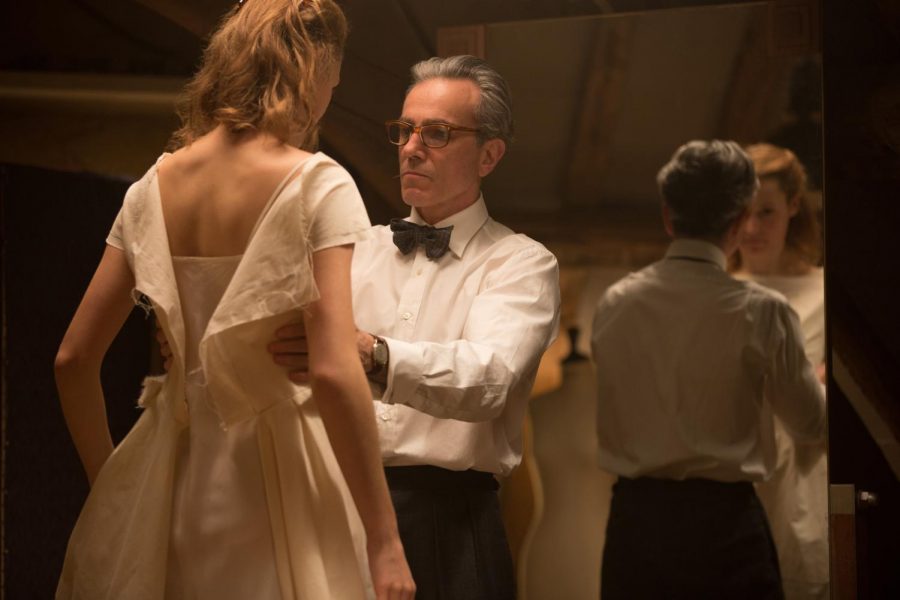Deliberate Complexity at the Heart of ‘Phantom Thread’
Courtesy of Laurie Sparham/Focus Features
Reynolds Woodcock, played by Daniel Day-Lewis, fits a dress on Alma, played by Vicky Krieps, in a scene from “Phantom Thread.”
February 20, 2018
Paul Thomas Anderson’s newest achievement, “Phantom Thread,” continues to be an intriguing
cinematic experience, even after six Oscar nominations seem to have set its place in the pantheon
of best films of the year. It owes its success less to media fanfare about the unlikely coupling of
lead actors and choice of setting, or reportedly difficult production, and more to the delicate and
nuanced affection it communicates to audiences.
Set in 1950’s London in the world of haute couture fashion, it’s an unexpected detour for
Anderson, who previously excelled at interrogating North America’s less glamorous depths.
The film tells the story of Reynolds Woodcock (Daniel Day-Lewis), an eccentric perfectionist;
his sister and business manager, Cyril (Lesley Manville); and Alma (Vicky Krieps), a free
spirited but head-strong waitress, who enters their world upon invitation and, inevitably, shakes
it up.
The set up may sound familiar. But Anderson, while tugging at the conventions, is careful not to
fall into well-trodden tracks. He strikes a perfect balance between drama and comedy, romance
and suspense, theatricality and hesitation.
Reynolds is a universe of a man. His all-consuming passion for work and charisma draw in
everyone around him, while the man himself is almost too complex to grasp or hold onto. Many
women try but fail, and Reynolds sinks further into his rigid habits. When he meets Alma, she
similarly falls into his world, but does not yield to it. She insists on giving and receiving love in
her own way, which makes her an equal match to both Reynolds and Cyril.
Anderson however doesn’t focus on rivalry, thereby eschewing banality. Instead, the relationship
between Reynolds and Alma, and Alma and Cyril, is based in recognition, devotion and a good
bit of teasing. The women in particular emanate a quiet power, a strength born out of resilience
rather than pride. Despite his excessive rules Reynolds is, in fact, at the mercy of the ladies that
surround him. It’s this complex contradictory nature of Anderson’s protagonists that makes them
so tangible and so human—however theatrical and idiosyncratic they may appear at first glance.
While prudent in this judgement of characters, Anderson holds no breath in bringing their world
to life. The production design portrays all the glamour and glory of high society, complete with satin scarves, polished china and a life-size paper mache space rocket at a New Year’s Eve party. The camera catches the most minute details, at times even focusing on the lining of a collar rather than the speaker’s face — a subtle nod to Woodcock’s garments as the fourth protagonist. We’re privy to a world where beauty is a product of
stringency and mystery alike. Hence, each shot is precise and deliberate, concealing clues within every frame, gesture and look. The web of mannerisms and emotions weaved by Day-Lewis, Krieps and Manville is as intricate as the fine garments they wear on screen.
Yet, for all this perfection and spectacle there is an air of hesitation. It’s the subtle feeling of
uncertainty inherent in love. For Reynolds and Alma are constantly discovering each other,
always learning how to show their affection and where to place their dedication. It is this that
makes Phantom Thread such an emotionally intelligent film. Rather than dramatizing the power
struggle embedded in every relationship, it illuminates the hard and unpredictable work of love. I
It welcomes many viewings, each time some new detail comes to light, indeed, as when looking
at a loved one.
A special screening of “Phantom Thread,” with a live accompaniment of the original score performed by the Wordless Music Orchestra and London Contemporary Orchestra, will take place at the Brooklyn Academy of Music on Feb. 24. Composed by Jonny Greenwood, Radiohead lead guitarist, the music provides an eloquent commentary on the thoughts and feelings of characters in the film.
A version of this article appeared in the Tuesday, Feb. 20 print edition. Email Zuzia Czemier-Wolonciej at [email protected].
























































































































































